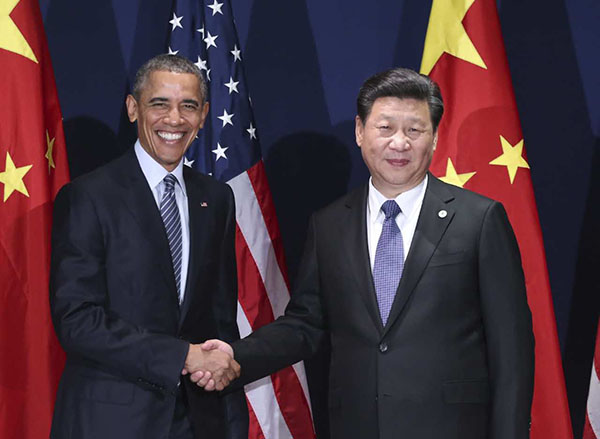Xi's foreign trips present China as a world player
By Chris Peterson (China Daily) Updated: 2015-12-05 09:34
 |
|
Chinese President Xi Jinping shakes hands with US President Barack Obama during their meeting at the start of the climate summit in Paris November 30, 2015. [Photo/Xinhua] |
President Xi Jinping has by my count become the most-travelled Chinese leader in modern times as he seeks to project his "Chinese Dream", which promotes the rejuvenation of the Chinese nation.
Significantly, his first major foreign trip was to Russia, where he held talks with Russian President Vladimir Putin, followed by visits to the United States, the United Kingdom, and some Asian countries. He has twice met in the US with US President Barack Obama, latterly on a state visit earlier this year. His last visit to the US also saw him deliver a keynote address to the United Nations; his pledges on peacekeeping and investment in UN projects made the message crystal clear.
Not only has China joined the club of leading nations, but also its leader is projecting an entirely new, forceful image of the country.
Consider the image projected by the Chinese military during this year's celebrations for the 70th anniversary of the victory against Japanese aggression on Sept 3. Scenes of rank upon rank of faultlessly drilled soldiers, sailors and airmen sent out the message that here was a country confident in its own image.
But unlike the images of old, which portrayed a vast, disciplined mass of people whose leaders were focused on domestic issues, the vision emanating from Beijing now is also one of inclusiveness, a desire to use China's economic might to benefit its neighbors and trade partners.
That is embodied in Xi's unique vision of the Silk Road Economic Belt and the 21st Century Maritime Silk Road, modern versions of the old Silk Road.
Billions of dollars are to be poured into infrastructure building on an overland route that takes in Afghanistan, Pakistan, Iran, Turkey, Russia and finally Western Europe. The sea route is ambitious, too, and already in use - container ships will ply the seas both ways from Zhanjiang in South China's Guangdong province, taking in Hanoi, Jakarta, Kuala Lumpur, Kolkata, Colombo, Mombasa, the Suez Canal, Athens and Venice.
China has also played the key role in the establishment of the Asian Infrastructure Investment Bank, the first international financial institution not dominated by the US or European countries, as well as the BRICS New Development Bank, which groups Brazil, Russia, India, China and South Africa.
All this is evidence of Xi's policy of projecting a rejuvenating China that seeks common development on the world stage. The killing of a Chinese hostage by Islamic State terrorists in Syria drew an immediate public condemnation of the IS group by Xi. And China, as a permanent member of the UN Security Council, joined the unanimous vote condemning the IS group and al-Nusra and calling for military action by individual states against the terrorists.
That is the overt message being projected by Xi's numerous foreign trips. But there's another side to it. The world is being given a look, rare for a Chinese leader, into his more human side.
There was the well-publicized visit to a small Beijing restaurant in December 2013 where, without the usual press entourage, he and a solitary aide ordered a meal of baozi, or steamed buns, paid for it from his own pocket, and ate with the regular diners. Of course, most of the occasion was recorded by fellow diners on their mobile phones. And his domestic image of a president with a human touch was cemented.
Beer and fish and chips in an English country pub with British Prime Minister David Cameron during his state visit here in October probably did more to put a human face on the Chinese president than all the speeches and photo-calls in the world. And as several British commentators noted, in some awe, "he drank the whole pint of IPA (India pale ale) and finished the chips".
There's no greater praise from the English point of view.
The author is managing editor, Europe, for China Daily. chris@mail.chinadailyuk.com

I’ve lived in China for quite a considerable time including my graduate school years, travelled and worked in a few cities and still choose my destination taking into consideration the density of smog or PM2.5 particulate matter in the region.











